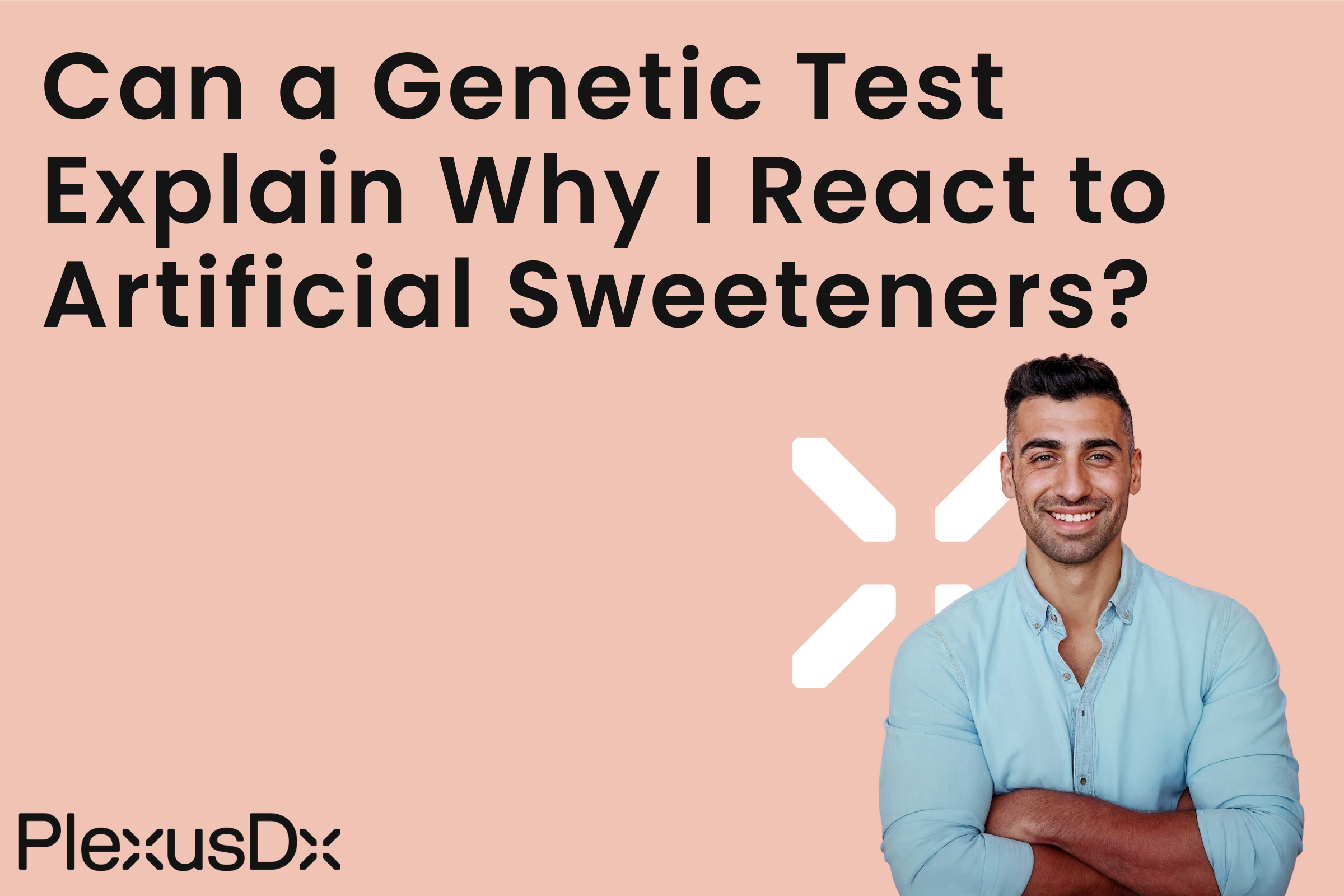Are Genetic Screenings Capable of Detecting the Underlying Causes of My Negative Responses to Synthetic Sweeteners?
Have you felt ill after consuming diet soda or sugar-free desserts? You're not alone. Artificial sweeteners cause adverse reactions in many people resulting in feelings of confusion and frustration. By utilizing genetic testing you can discover the biological reasons behind adverse reactions to artificial sweeteners in your body. This blog post explores genetic determinants of artificial sweetener reactions and demonstrates how PlexusDx's Precision Health & Wellness tests deliver essential insights into your health profile.
Specific people experience negative reactions because their genetic makeup interacts with artificial sweeteners.
Sucralose works together with aspartame and saccharin in artificial sweeteners to replace standard sugar. Even though regulatory bodies ensure artificial sweeteners are safe for consumption people still show diverse reactions to them. Users of artificial sweeteners frequently suffer from headaches and digestive problems along with allergic reactions. This variability often leads to the question: What causes some people to experience negative effects from artificial sweeteners yet leaves others unaffected by them?
The answer may lie in your genes. Your genetic makeup determines how your body processes artificial sweeteners. Genetic markers influence how enzymes break down sweetener compounds in the body. Crucial enzymes shortages or metabolic pathway changes cause negative effects in your body during substance processing. Your genetic composition directly determines the makeup of your gut microbiome which performs essential functions in breaking down food and additives.
Personal anecdotes abound in this area. She realized that her inherited predisposition to migraines was aggravated by consuming products containing aspartame too often. Her genetic test results demonstrated that she carried a distinctive genetic variant which caused sensitivity to certain food additives. Knowledge of her genetic predisposition allowed her to select foods that would keep her discomfort at bay.
Genetic testing uncovers the concealed processes that determine how your body reacts to different substances.
Genetic evaluation reveals how artificial sweeteners influence your body. Through genome analysis you can learn about your metabolic processes and identify foods that trigger negative reactions in your body. This method shows multiple important advantages when used for genetic testing.
- Personalized Insights: Genetic testing reveals specific genetic variants that alter how you react to artificial sweeteners which enables you to customize your diet accordingly.
- Informed Choices: By understanding your genetic predispositions you can select foods that avoid triggering adverse reactions to particular ingredients.
- Enhanced Communication with Healthcare Providers: Your genetic information enables you to discuss dietary choices and symptom management with your healthcare provider in a more effective manner.
Practical Steps to Take After Genetic Testing
What steps must you follow after completing your genetic testing process? These steps guide people through selecting diet-friendly artificial sweeteners using reliable information.
- Review Your Genetic Report: Thorough review of your PlexusDx genetic profile will help you collect vital information. Study your genetic report to detect markers indicating food sensitivities and metabolic pathways that react to artificial sweeteners. Making informed decisions relies on a proper understanding of available information.
- Keep a Food Diary: Track every food item you consume and make a note of any negative reactions that occur. This method enables detection of patterns and identification of sweeteners that trigger adverse reactions. Record the sweetener type you consumed along with the amount you ingested and any symptoms that followed.
- Consult with a Healthcare Provider: To perform accurate analysis your healthcare provider needs access to both your genetic report and food diary records. Healthcare providers examine your test results to create a personalized diet plan which takes into account your genetic predispositions.
- Experiment with Alternatives: When artificial sweeteners cause negative health effects, you should opt for natural sweetener substitutes. Your body generally tolerates natural sweeteners like stevia, monk fruit, and erythritol better.
- Stay Informed: Track the latest research discoveries which explain how artificial sweeteners interact with genetic elements. Scientific progress provides new insights that improve how you understand your nutritional choices.
Conclusion
To comprehend how your body responds to artificial sweeteners requires commitment but genetic testing provides a method to analyze your personal health profile. PlexusDx Precision Health & Wellness tests help identify genetic elements that influence your body's responses to normal food additives. Knowledge backed by accurate information gives you power to make smart food choices that improve your health. Take the first step toward better health management by visiting PlexusDx.com or shopping through Amazon and Walmart.
Where to Buy PlexusDx Genetic Tests
Ready to take control of your health with precision genetic insights? You can purchase the PlexusDx Food Sensitivity and Allergy Genetic Test from these trusted retailers:
- 👉 PlexusDx – Order directly from our official website.
- 👉 Amazon – Convenient shopping with fast shipping.
- 👉 Walmart – Buy online from a trusted retailer.
Get your personalized DNA insights today and start optimizing your health! 🚀

Share:
Does My DNA Influence How Quickly I Pick Up New Skills?
Does My DNA Influence How Quickly I Pick Up New Skills?